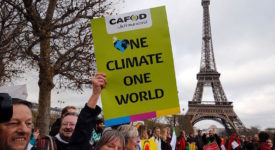The incoming European Commission led by Ursula von der Leyen has been given the green light by MEPs after a key vote in the European Parliament. Von der Leyen, who is the first ever female Commission President, will take office with her team of Commissioners on 1 December. The former German politician has made gender equality one of the priorities of her 2019-2024 tenure – female representation in the Commission is the highest it has ever been, with her Commission team comprising 12 female members and 15 male members.
In the run-up to Wednesday’s (27 November) vote, von der Leyen addressed MEPs, highlighting the fight against global warming as a key priority and calling for a transition towards climate neutrality by mid-century. “If there is one area where the world needs our leadership, it is on protecting our climate,” she told the packed plenary and adding that “this is an existential issue for Europe – and for the world.” Von der Leyen also stressed that the European Green Deal, a flagship policy of the von der Leyen Commission, must work “for the health of our planet and our people and for our economy,” while Dutch official Dutch official Frans Timmermans was, in her words, “the right person to make this happen.”
The incoming Commission President also acknowledged that the new Commission takes office after a turbulent few years for the EU, which has had to try to manage a series of major challenges and crises that included, among others, the Eurozone crisis, migration, Brexit and a surge in support for Eurosceptic political parties. In a news briefing later on Wednesday, von der Leyen once again outlined many of her Commission’s commitments mentioned in her speech, highlighting that appropriate investment and regulatory frameworks will be implemented to enable Europe to lead the way internationally on a range of what she called “critical issues,” including environmental protection and climate change, growth, inclusion, innovation and digitalization as well as the protection of democracy.
Article Categories:
INSTITUTIONS & POLICY-MAKING






